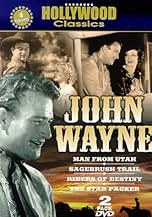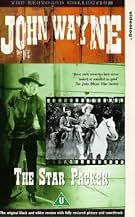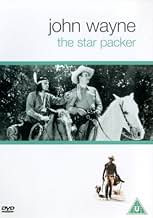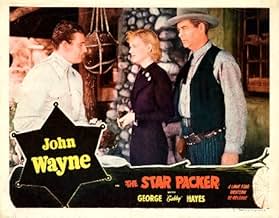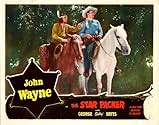NOTE IMDb
5,1/10
1,4 k
MA NOTE
Ajouter une intrigue dans votre langueA gang working for The Shadow is terrorizing the town. John Travers decides to take on the job of sheriff and do something about it.A gang working for The Shadow is terrorizing the town. John Travers decides to take on the job of sheriff and do something about it.A gang working for The Shadow is terrorizing the town. John Travers decides to take on the job of sheriff and do something about it.
- Réalisation
- Scénario
- Casting principal
George 'Gabby' Hayes
- Matt Matlock
- (as George Hayes)
Eddie Parker
- Parker
- (as Ed Parker)
Thomas G. Lingham
- Sheriff Al Davis
- (as Tom Lingham)
Davie Aldrich
- Boy
- (non crédité)
Frank Ball
- Townsman
- (non crédité)
George Cleveland
- Jake
- (non crédité)
Starlight the Horse
- John's Horse
- (non crédité)
Arthur Millett
- Townsman
- (non crédité)
Artie Ortego
- Pat
- (non crédité)
Tex Palmer
- Dave
- (non crédité)
Bud Pope
- Wagon Henchman
- (non crédité)
Glenn Strange
- Loco Frank
- (non crédité)
Avis à la une
On the surface this looks like a mundane 30s oater meant as a filler during matinees. But it really is much more than that. Besides the pleasure of seeing a young John Wayne after "The Big Trail" and before his breakout role in "Stagecoach", you have the talents of Yakima Canutt as Wayne's native American assistant, one of the best stunt men in the business who lived to the ripe old age of 90. Oh, and he wasn't actually native American, as many articles falsely say.
Wayne plays a federal man meant to clean out a gang led by "The Shadow" that has been brazenly carrying out all kinds of crimes in and around a town and killing all of the sheriffs. Wayne shows up and takes the job as The Shadow has just killed the last one. Strangely enough his henchmen talk to him through what looks like a wall safe in a back room in the jail house. You have to wonder how the first conversation between this guy and a criminal got started, but I guess that's another story.
The heroine is not just some helpless gal that shrieks, although Duke does have to rescue her from a runaway stage in the beginning. But later she shows her toughness as she is harassed through her bedroom window at night by a stranger. She just calmly gets out of bed, grabs her gun, shoots the peeping tom, and goes back to sleep. There's a little lady who knows how to handle a home invasion!
Oh, and some hints for evil doers. If you are caught in the act and asked in the plain light of day who the ring leader is don''t respond with a lengthy prologue like "OK, OK, I'll tell, I'll tell...". This gives the Shadow time to shoot you.
My title comes from the fact that the final chase on horseback - there always is one in these old westerns - has Duke and the men of the town all wearing white head scarves to differentiate themselves from the Shadow's gang that is coming to attack the town. The thing is, they are not scarves they are head bandages,so they all look like head injury victims. It really is a humorous scene.
Recommended for an early John Wayne, a rather clever plot with some unusual twists and turns, and the great Yakima Canutt, stuntman and second unit director extraordinaire.
Wayne plays a federal man meant to clean out a gang led by "The Shadow" that has been brazenly carrying out all kinds of crimes in and around a town and killing all of the sheriffs. Wayne shows up and takes the job as The Shadow has just killed the last one. Strangely enough his henchmen talk to him through what looks like a wall safe in a back room in the jail house. You have to wonder how the first conversation between this guy and a criminal got started, but I guess that's another story.
The heroine is not just some helpless gal that shrieks, although Duke does have to rescue her from a runaway stage in the beginning. But later she shows her toughness as she is harassed through her bedroom window at night by a stranger. She just calmly gets out of bed, grabs her gun, shoots the peeping tom, and goes back to sleep. There's a little lady who knows how to handle a home invasion!
Oh, and some hints for evil doers. If you are caught in the act and asked in the plain light of day who the ring leader is don''t respond with a lengthy prologue like "OK, OK, I'll tell, I'll tell...". This gives the Shadow time to shoot you.
My title comes from the fact that the final chase on horseback - there always is one in these old westerns - has Duke and the men of the town all wearing white head scarves to differentiate themselves from the Shadow's gang that is coming to attack the town. The thing is, they are not scarves they are head bandages,so they all look like head injury victims. It really is a humorous scene.
Recommended for an early John Wayne, a rather clever plot with some unusual twists and turns, and the great Yakima Canutt, stuntman and second unit director extraordinaire.
This is an early John Wayne oater. It is very typical for that era. John Wayne, of course, plays the good guy and a lawman, and Yakima Canute, who is in a ton of John Wayne's early movies, usually as a bad guy, plays a good guy for a change. even it it is a very stereotypical Indian sidekick, (insensitive by today's politically correct idiots). Of course this movie is in black and white, since color was still on the horizon, so some of the video does leave a bit to be desired but I did and still do enjoy the good guy versus bad guy movies where most things are pretty clear. I also like his later movies that had a bit more suspense.
As "B' westerns go for this period, this one isn't bad. In fact, in my opinion, it's one of the best of John Wayne's early "B" westerns. It has all of the right ingredients to make this an enjoyable hour.
First and foremost it has Yakima Canutt just emerging at this time as one of the premier stunt men, performing many of his landmark stunts. There are horse falls, saving the runaway stage, a wagon going over that ever present cliff and a bang up fight scene between Wayne's character and one of the bad guys.
Canutt also has a part in the picture and is a hoot as Wayne's faithful Indian companion "Yak". Wayne himself is better than usual for this time as an undercover government agent. Also. a clean shaven George (pre-Gabby) Hayes appears as the chief villain.
Another oddity for "B" westerns of this time, is that the hero ends up married to the heroine and has a son at the end of the film (no kissing though).
First and foremost it has Yakima Canutt just emerging at this time as one of the premier stunt men, performing many of his landmark stunts. There are horse falls, saving the runaway stage, a wagon going over that ever present cliff and a bang up fight scene between Wayne's character and one of the bad guys.
Canutt also has a part in the picture and is a hoot as Wayne's faithful Indian companion "Yak". Wayne himself is better than usual for this time as an undercover government agent. Also. a clean shaven George (pre-Gabby) Hayes appears as the chief villain.
Another oddity for "B" westerns of this time, is that the hero ends up married to the heroine and has a son at the end of the film (no kissing though).
This is a real B movie, right down to the historical imprecision of a location featuring both stage coaches and telephones, its clichéd dialogue, a totally predictable plot straight out of the comics and enough protracted chases and gunfights to fill in the gaps left by a very thin script.
The Duke and his entourage provide plenty of ironic laughs but, if you want to take the movie at face value, it is quite enjoyable. The good guys win, the bad guys get their comeuppance, the Duke gets his gal and Yakima Canutt shows his tricks all in a setting that engrossed generations of schoolboys over most of the 20th century.
The Star Packers should also be of interest to students of cinema as its structure encapsulates the early movement of silent film into the talkies.
The Duke and his entourage provide plenty of ironic laughs but, if you want to take the movie at face value, it is quite enjoyable. The good guys win, the bad guys get their comeuppance, the Duke gets his gal and Yakima Canutt shows his tricks all in a setting that engrossed generations of schoolboys over most of the 20th century.
The Star Packers should also be of interest to students of cinema as its structure encapsulates the early movement of silent film into the talkies.
Definitely the best of John Wayne's million early films, although the acting and production values were of the usual B Western standard the plot was probably more cohesive than usual and more watchable. And almost believable, too! The Lone Star Saloon in Lone Star Town also had a good part in this one.
It's pretty obvious who the baddie will turn out to be (yet again!) - you can almost hear the boos from the kids in the audience from the mid-'30's when he makes his appearance, again as a beardless two-faced sidewinder. I assume here that unlike nowadays kids back then knew the difference between good guys and bad guys and right and wrong. Yakima Canutt is playing a Tonto character in here, Wayne is as dashing as always, the chases and ambushes are everything to be desired, in fact especially hair-raising. However, I can't actually remember now Wayne actually packing a Star, if he did he didn't make the same song and dance about it as he did in Rio Bravo! And everything is corny, contrived and creaky - but I love it just the same.
As far as I'm concerned it's a very pleasant way to fill an hour - a lot is "packed" into an hour. If you forced yourself to watch Star Packer in its entirety and found it dreadful you'll never get that hour back, but my friendly observation is you certainly won't like any of Wayne's other films for Lone Star.
It's pretty obvious who the baddie will turn out to be (yet again!) - you can almost hear the boos from the kids in the audience from the mid-'30's when he makes his appearance, again as a beardless two-faced sidewinder. I assume here that unlike nowadays kids back then knew the difference between good guys and bad guys and right and wrong. Yakima Canutt is playing a Tonto character in here, Wayne is as dashing as always, the chases and ambushes are everything to be desired, in fact especially hair-raising. However, I can't actually remember now Wayne actually packing a Star, if he did he didn't make the same song and dance about it as he did in Rio Bravo! And everything is corny, contrived and creaky - but I love it just the same.
As far as I'm concerned it's a very pleasant way to fill an hour - a lot is "packed" into an hour. If you forced yourself to watch Star Packer in its entirety and found it dreadful you'll never get that hour back, but my friendly observation is you certainly won't like any of Wayne's other films for Lone Star.
Le saviez-vous
- AnecdotesThe Matlock ranch house is the same house as Juanita's in The Desert Trail (1935) and as Malgrove's in Panique à Yucca City (1934).
- GaffesDespite the title "The Star Packer", Travers never wears a badge at any time in the film.
- Citations
U.S. Marshal John Travers: Whaddya find out?
Yak: Two men gonna hold up stage - Coyote Canyon. Much money on stage.
U.S. Marshal John Travers: Well, it looks like we're going to have our hands full.
Yak: More trouble - more fun!
U.S. Marshal John Travers: That's one way to look at it.
- Versions alternativesAlso available in a computer colorized version.
- ConnexionsFeatured in 100 Years of John Wayne (2007)
Meilleurs choix
Connectez-vous pour évaluer et suivre la liste de favoris afin de recevoir des recommandations personnalisées
- How long is The Star Packer?Alimenté par Alexa
Détails
- Durée
- 53 minutes
- Couleur
- Rapport de forme
- 1.37 : 1
Contribuer à cette page
Suggérer une modification ou ajouter du contenu manquant

